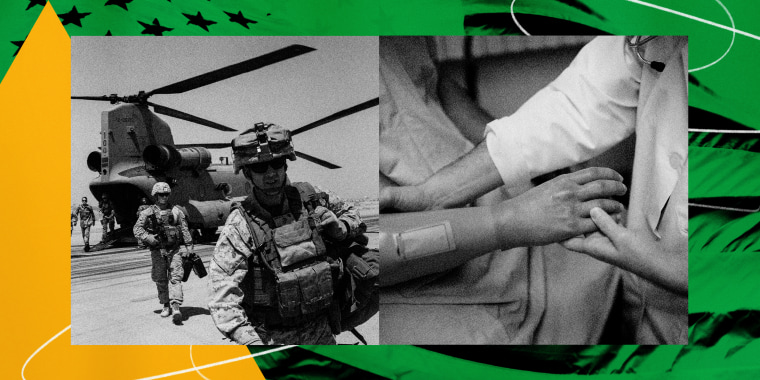Help us celebrate MSNBC's first 25 years by joining us every day for 25 days as our anchors, hosts and correspondents share their thoughts about where we've been — and where we're going.
When MSNBC launched in the summer of 1996, America was in the middle of a presidential campaign — and a period of relative peace. The debate between President Bill Clinton and Bob Dole was mostly domestic, with balanced budgets, welfare reform and the Republican "Contract With America" all on the agenda.
There is a deal America makes with its troops: You risk your lives in dangerous places to defend the country and to preserve its freedom, and, in return, we will take care of you when you come home.
Five years later, the serenity of that era was shattered, and a painful new one was born, when terrorists hijacked planes and flew them into the World Trade Center, the Pentagon and, thanks to the heroism of brave passengers on a third plane headed for Washington, a field in Pennsylvania.
As shock, fear and anger gripped the country in the days after 9/11, the men and women of the all-volunteer U.S. military were packing up and shipping out to do something about it. For 20 years now, they have been far from home, sacrificing their physical and mental health, their time with their families and, in too many cases, their lives.
There is a deal America makes with its troops: You risk your lives in dangerous places to defend the country and to preserve its freedom, and, in return, we will take care of you when you come home. That means more from the rest of us than saying "Thank you for your service" when we see a member of the military walking through an airport. It means a massive collective effort, from government and veterans groups and in our communities, to care for the physical and mental well-being of the less than 1 percent of Americans who fight our wars. We must do better.
Suicides among post-9/11 active-duty service members and veterans now far outstrip combat deaths.
Health care, including the treatment of post-traumatic stress disorder and traumatic brain injury, is not reaching all of the people who need it desperately.
And the long-term impacts of burn pits, where tons of waste are burned with jet fuel at military installations abroad and the fumes are breathed in by those serving there, are just now being understood.
My father earned a Bronze Star serving with the Army's First Infantry in Vietnam. When he began to experience tremors more than 20 years later, the only answer doctors could offer was that the exposure to Agent Orange had affected his neurological system. He has been living with Parkinson's disease for 30 years.
Paul Rieckhoff, a first lieutenant who served with the Army in Iraq and founded the prominent post-9/11 veterans group IAVA, warns that burn pits may well be the Agent Orange of this generation's military. The issue demands our urgent attention.
As President Joe Biden calls home the last of the American troops in Afghanistan ahead of the 20th anniversary of Sept. 11 and that country slips back closer to its pre-9/11 status, Rieckhoff warns about something else we must account for: sadness. That is, the lingering questions that come inevitably to veterans: Why did my friends die? Why was I scarred, in ways seen and unseen? Why did I sacrifice my family life to fight halfway around the world? What was it all for?
We need to hear them, even if they don't ask those questions out loud. We need to remember what they did for us in those darkest days and in the two decades since. And as we think ahead to the next two decades — and beyond — we need to hold up our end of that bargain.

